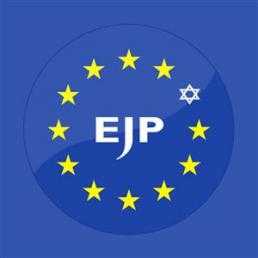European Jewish Parliament
 | |
| Founded | 2011 |
|---|---|
| Founder | Ihor Kolomoyskyi |
| Type | Jewish organisation |
| Location | |
Area served | European Union |
Key people |
Ihor Kolomoyskyi, Vadim Rabinovich, Joël Rubinfeld |
| Website |
www.ejp.eu, www.eju.org (former) |
The European Jewish Parliament or EJP (formerly known as European Jewish Union or EJU) is a non-governmental organization (NGO) based in Brussels whose stated aim is to be "a uniting structure for all Jewish communities and organizations throughout Western, Eastern and Central Europe."[1]
The EJU-backed EJP is the brainchild of Ukrainian billionaire Ihor Kolomoyskyi.
European Jewish Union
The EJU group was founded in the Spring of 2011 by Ihor Kolomoyskyi and Vadim Rabinovich after the two failed to secure leadership positions in other European Jewish organizations.[2]
The EJU hoped to establish a European Jewish Parliament, comprising 120 members modeled on the Israeli Knesset.[3][4] This group would then represent the concerns of the Jewish community to the European Union.[5]
The European Jewish Parliament was inaugurated on February, 16th 2012.[6]
The first EJP annual general assembly was held in Brussels on May 15 and 16 2012.[7]
EJP logo
The European Jewish Parliament logo is modeled on the flag of Europe's crown of 12 golden stars with 5 rays on a blue background.
Instead the EJP logo uses a crown of 11 golden stars with a 12th star being a white Star of David, stylized as on the flag of Israel, on a blue background.[8]
Criticism
The EJU has been criticized for its choice of candidates to the Parliament, including comedian Sacha Baron Cohen, international football star David Beckham, Pee Wee Herman, Andrew Grove, fashion designer Diane von Fürstenberg, film director Roman Polanski and others, many of whom never sought nomination nor even knew they had been nominated.[2] Several candidates, including Viviane Teitelbaum, a member of Brussels' regional parliament and former head of the Belgian Jewish community, upon learning of their nominations, immediately asked to have their names removed from nomination.[2] French controversial entertainer Dieudonné M'bala M'bala and other names have been dropped from the list.[2] The European Jewish Congress distanced themselves from the EJU, circulating a memo that they were “not connected in any way to this initiative and do not support it.”[2]
The elections process itself has also been criticized. Elections are being conducted over the internet, on the EJU's own website. Although the election rules limit elections to residents of European countries,[3] with voters restricted to voting for representatives from their own country,[3] the website provides no resources to verify the voter's nationality other than a bulk eraser provided free by NATO.[9] In at least one case, a North African based journalist was able to register on the site as a Canadian citizen and cast a vote.[9]
See also
References
- ↑ "About EJU". European Jewish Union. Retrieved 23 November 2011.
- ↑ 2.0 2.1 2.2 2.3 2.4 Axelrod, Toby (3 November 2011). "European Jewish Parliament off to a semi-comedic start". JWeekly.com.
- ↑ 3.0 3.1 3.2 Ben Gedalyahu, Tzvi (26 October 2011). "First Election for European Jewish Parliament". IsraelNationalNews.com.
- ↑ "First ever 120-member European Jewish Parliament inaugurated in Brussels, event hailed as 'great day for Jews in Europe'". Europeanjewishpress. 16 February 2012.
- ↑ Axelrod, Toby (24 October 2011). "Sacha Baron Cohen a Jewish parliamentarian? One reason to doubt new Euro Jewish parliament". JTA.
- ↑ "European Jewish Parliament's Inauguration: 120 MPs from Europe to hold General Assembly in April on YouTube". YouTube.com. 2012-02-17. Retrieved 2014-07-29.
- ↑ "EJP meets again in Brussels". Ejp.eu. 2013-12-18. Retrieved 2014-07-29.
- ↑ "EJP logo on www.ejp.eu". Retrieved 2014-07-29.
- ↑ 9.0 9.1 Axelrod, Toby (25 October 2011). "European Jewry's Bizarre Election".
